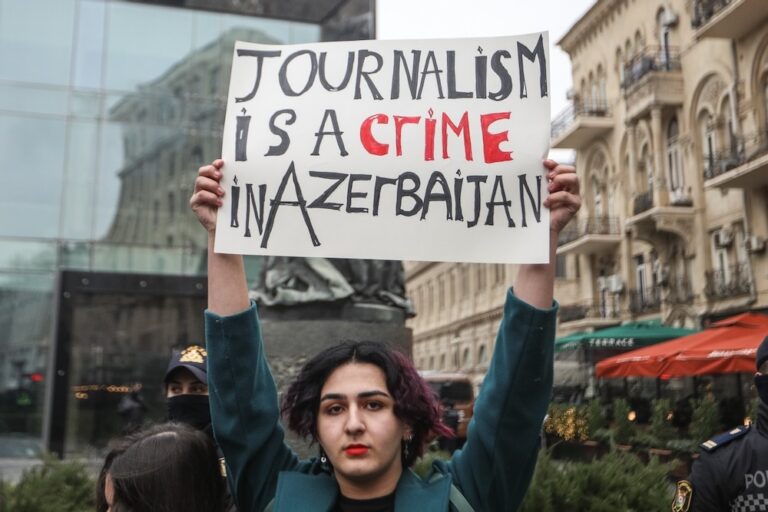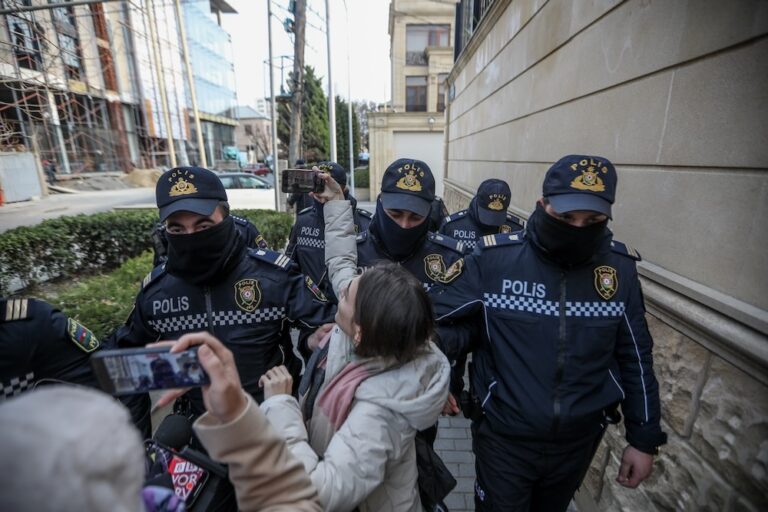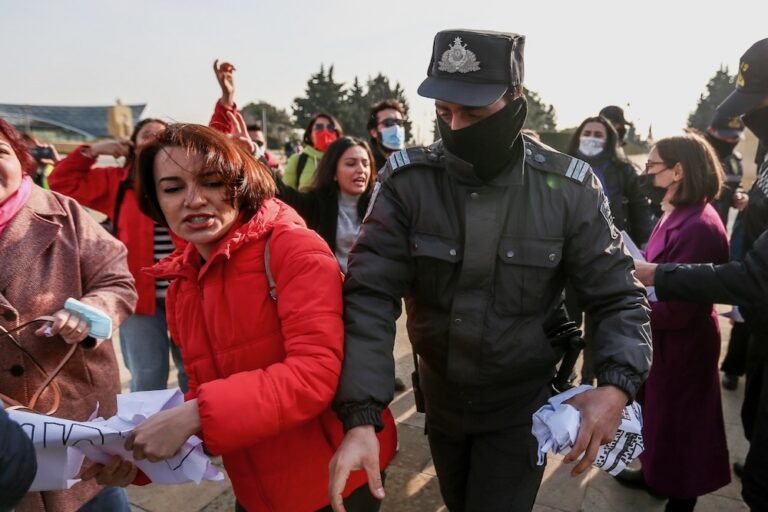In the weeks leading up to the 11-15 April Parliamentary Assembly of the Council of Europe session, the authorities have engaged in a crackdown on freedom of expression in the country.
(ARTICLE 19/IFEX) – 12 April 2011 – Member organisations of the International Partnership Group for Azerbaijan (IPGA) are deeply concerned by the rapidly deteriorating freedom of expression situation in Azerbaijan. In recent weeks there has been a wave of arrests and beatings of activists and journalists in connection with a series of pro-democracy protests in the country as well as an increase in pressure against non-governmental organisations, and two journalists have been abducted and beaten in connection with criticising the authorities. The IPGA calls on the Parliamentary Assembly of the Council of Europe (PACE) to take immediate action to address this alarming state of affairs.
Although Azerbaijan is bound as a Council of Europe Member State to respect and protect the right to freedom of expression, in the weeks leading up to the 11-15 April 2011 PACE session the Azerbaijani authorities have engaged in a crackdown on freedom of expression in the country.
The IPGA is particularly concerned by a number of disturbing recent trends, including:
* The wave of arrests and beatings connected with recent protests. From February to April 2011, the Azerbaijani authorities arrested hundreds of people for participating in a series of pro-democracy protests inspired by recent events in the Middle East and North Africa and used force to break up the protests. Further, dozens of cyber and political activists involved in organising these protests were arrested in the run-up to the events. These include blogger and youth activist Bakhtiyar Hajiyev, who faces up to two years’ imprisonment on charges of evading military service, and opposition political activist Jabbar Savalan, who faces up to three years’ imprisonment on charges of drug possession. For the first time, authorities have initiated criminal charges against a cyber activist based outside of Azerbaijan by investigating Strasbourg-based activist Elnur Majidli – who was involved with calling for the protests on Facebook – on charges of inciting hatred.
* Increased pressure against non-governmental organisations (NGOs). From February to April 2011, the Azerbaijani authorities stepped up pressure against NGOs working on democracy and human rights issues. In March 2011, authorities ordered the closure of three NGOs in the Azerbaijani city of Ganja. On 10 March 2011, the Ministry of Justice also ordered the closure of the Human Rights House Azerbaijan. Other Baku-based NGOs have reported increased pressure by authorities, including the Institute for Reporters’ Freedom and Safety, whose employees have faced surveillance, harassment and detention in recent weeks. On 16 March 2011, the Cabinet of Ministers issued a decree (no. 43) tightening regulations for foreign NGOs operating in the country.
* Violence against journalists and impunity for their attackers. In recent weeks, two journalists have been abducted and beaten in connection with their criticism of the authorities. On 26 March 2011, Azadliq newspaper correspondent Seymur Khaziyev was abducted, beaten, and warned to cease criticism of Azerbaijani President Ilham Aliyev. On 3 April 2011, Azadliq newspaper correspondent Ramin Deko was abducted and warned to stop criticising the authorities. He was later attacked and threatened on 4 April 2011. In virtually no case of violence against journalists over the past six years have the perpetrators been identified and brought to justice, including the March 2005 murder of editor Elmar Huseynov.
* The continued wrongful imprisonment of editor Eynulla Fatullayev. Fatullayev has been in prison since April 2007 on a range of politically motivated charges related to his activities as a critical investigative journalist. Rather than complying with a European Court of Human Rights judgment in April 2010 ordering his immediate release, the authorities proceeded with another politically motivated charge of drug possession, for which Fatullayev currently remains wrongfully imprisoned.
The IPGA calls on PACE to take immediate action to address this situation, including:
* Increasing efforts to monitor Azerbaijan’s compliance with its obligations as a Member State of the Council of Europe, including calling for a visit to the country by the Co-rapporteurs for the Honouring of Obligations and Commitments by Azerbaijan to assess the current situation and to follow up on concerns raised in their May 2010 report on the functioning of democratic institutions in Azerbaijan;
* Including a debate on the honouring of obligations and commitments by Azerbaijan on the agenda for the 20-24 June 2011 PACE session and issuing a resolution with concrete recommendations for improving the freedom of expression situation in the country;
* Following up on the recommendations made in Resolution 1750 (2010) on the functioning of democratic institutions in Azerbaijan, particularly those calling for the release of Eynulla Fatullayev, the decriminalisation of defamation, and the establishment of an environment in which journalists can conduct their professional activists free from interference by the authorities;
* Calling on the Azerbaijani authorities to fully cooperate with the Special Rapporteur on the Situation of Political Prisoners in Azerbaijan, including by immediately inviting him to undertake a visit to the country per his mandate;
* Requesting the Council of Europe Committee of Ministers to review the freedom of expression situation in Azerbaijan as a standing item for consideration at its weekly meetings;
* Calling for the Council of Europe Committee of Ministers to enforce Azerbaijan’s execution of judgments of the European Court of Human Rights, including by issuing a resolution demanding the immediate release of Eynulla Fatullayev and referring Fatullayev’s case back to the Court under Article 46 of the European Convention on Human Rights; and
* Requesting the Council of Europe Commissioner for Human Rights to undertake a visit to Azerbaijan to assess the current situation and to follow up on concerns highlighted in the report from his March 2010 visit.
BACKGROUND:
The IPGA is a coalition of 20 international NGOs working to promote and protect freedom of expression in Azerbaijan.
A delegation of members of the IPGA was scheduled to travel to Strasbourg to raise concerns regarding the freedom of expression situation in Azerbaijan during the 11-15 April 2011 PACE session.
Human Rights House Foundation
Open Society Institute – Assistance Foundation


